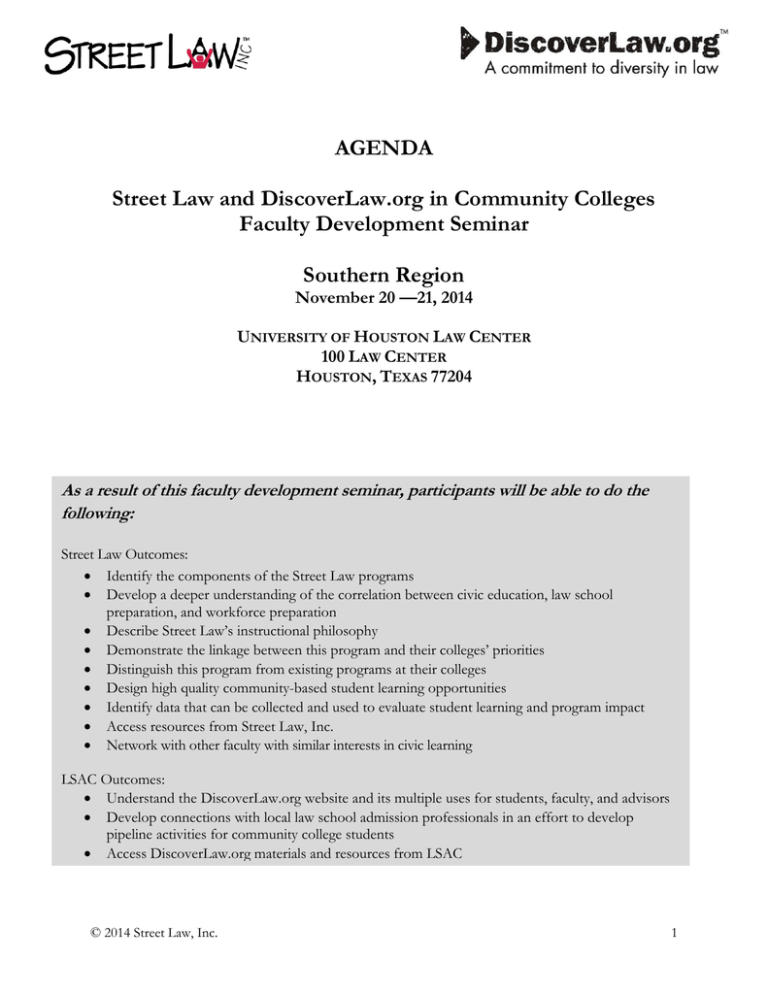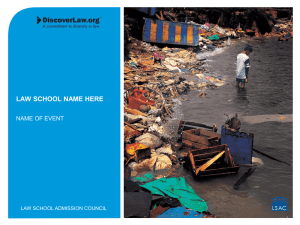AGENDA Street Law and DiscoverLaw.org in Community Colleges Faculty Development Seminar
advertisement

AGENDA Street Law and DiscoverLaw.org in Community Colleges Faculty Development Seminar Southern Region November 20 —21, 2014 UNIVERSITY OF HOUSTON LAW CENTER 100 LAW CENTER HOUSTON, TEXAS 77204 As a result of this faculty development seminar, participants will be able to do the following: Street Law Outcomes: Identify the components of the Street Law programs Develop a deeper understanding of the correlation between civic education, law school preparation, and workforce preparation Describe Street Law’s instructional philosophy Demonstrate the linkage between this program and their colleges’ priorities Distinguish this program from existing programs at their colleges Design high quality community-based student learning opportunities Identify data that can be collected and used to evaluate student learning and program impact Access resources from Street Law, Inc. Network with other faculty with similar interests in civic learning LSAC Outcomes: Understand the DiscoverLaw.org website and its multiple uses for students, faculty, and advisors Develop connections with local law school admission professionals in an effort to develop pipeline activities for community college students Access DiscoverLaw.org materials and resources from LSAC © 2014 Street Law, Inc. 1 Thursday, November 20th (209 BLB) 9:30 – 10:00 a.m. Continental Breakfast and Registration 10:00 – 11:00 a.m. Introductions and Overview of the Seminar During this session, participants will meet each other and be introduced to the agenda for the seminar. There will be a brief introduction to the cosponsoring organizations. (David Smith, Community College Consultant at Street Law, and Kent Lollis, Executive Director of Diversity Initiatives at LSAC) 11:00 – 11:45 a.m. Developing a Framework for a Law-Based Civic Learning Program We will use the think/pair/share teaching strategy to generate skill outcomes necessary to develop civically savvy community college students. Once we collect the group’s thinking, we will identify instructional methods likely to develop and strengthen these skills. We will then compare the civic education skills to the skills that the American Bar Association’s Section on Legal Education and Admission to the Bar says are helpful to prepare for law school. This will help us develop a vision for what this course looks like both inside and outside the classroom. 11:45 a.m. – 12:45 p.m. Lunch— From Community College to Law School: A Law Student Panel Students currently enrolled in neighboring law schools who have attended two-year colleges will share their experiences. (Kent Lollis) 12:45 – 1:45 p.m. The Street Law Curriculum and Lesson Demonstration —The Classroom Component This session focuses on what makes the Street Law curriculum unique. One component is the textbook, Street Law: Understanding Law and Legal Issues (McGraw-Hill, 2012), which includes text and activities related to: Introduction to the legal system Criminal and juvenile justice Torts Consumer and housing law Family law Individual rights and liberties The characteristics of Street Law lessons are also distinctive because © 2014 Street Law, Inc. 2 they are relevant and contemporary; the lessons are designed to involve all students in what we know are very diverse classrooms; the lessons are based on a “constructivist” philosophy; interactivity in the lessons is designed to develop student voice (advocacy capacity) and civic engagement skills; many lessons can be strengthened by involving resource persons (i.e., guest experts from the community who participate in the activities and do not give long lectures); and many lessons naturally include information about a range of law-related careers. David Smith will lead an interactive lesson, which focuses on the issue of whether ex-felons should have their voting rights restored and will demonstrate a model for teaching about a law-related public policy issue. 1:45 – 2:15 p.m. View from the Classroom Professor Royce West will share his success in offering Street Law to students at the University of Texas in Arlington. He participated in the fall 2013 faculty development seminar that was held in Baltimore, MD. 2:15 – 2:45 p.m. Designing Community Projects that Complement Classroom Learning—The Community Component We will view a short video that features the primary community learning activity conducted by Professor O’Guinn’s Street Law class during the spring 2012 semester. We will then brainstorm some service learning curriculum-related activities that could be made available for the community college students. (David Smith) 2:45 – 3:00 p.m. Break 3:00 – 4:00 p.m. Using DiscoverLaw.org and LSAC Resources with Your Students—The Pipeline Component DiscoverLaw.org website tour, video, and in-class resources for faculty Benefits of signing up at DiscoverLaw.org (handout) DiscoverLaw.org Months (handout) Other Diversity Initiatives and LSAC resources (handout) © 2014 Street Law, Inc. 3 Yessenia García-Lebrón and Yusuf Abdul-Kareem, Assistant Directors for Diversity Initiatives at Law School Admission Council, will lead this session. 4:00 – 5:00 p.m. 5:15 – 6:30 p.m. Going to Law School: A Panel Discussion with Law School Representatives This collaborative session, co-facilitated by LSAC’s Kent Lollis, XX of University of Houston Law Center, and XX of XX Law School will identify potential pipeline activities that can be conducted collaboratively between community colleges and nearby law schools. Networking Reception and Cocktail Hour with Heavy Hors D’oeuvres (Heritage Room) Friday, November 21st (209 BLB) 8:30 – 9:00 a.m. Coffee and continental breakfast 9:00 – 9:15 a.m. Review of Day One and Preview of Day Two David Smith and Kent Lollis will lead this session. 9:15 - 10:15 a.m. Street Law Lesson Demonstration: Case Study Method This lesson demonstrates the use of the case study method in the Street Law curriculum. The case involves the challenging First Amendment issue where freedom of speech, freedom of religion and establishment of religion collide in the context of a public secondary school. This case teaches constitutional content, an essential element of civic learning. It also promotes close reading of textual material and complex problem solving, which helps prepare students for the intellectual rigor of law school. (David Smith) 10:15 – 10:45 a.m. Coffee and Team Planning Refresh your coffee and meet in disciplinary teams to plan your Street Law program. 10:45 – 11:30 a.m. Support provided by Street Law Marketing materials Testing materials McGraw-Hill’s Create website Online resource library Supplementary materials © 2014 Street Law, Inc. 4 Xinia Bermudez, program manager for Street Law’s community college initiative, will help participants take advantage of the support offered. 11:30 a.m. – 12:00p.m. Measuring Success – the end of course survey How was the survey designed? Why were these outcomes selected? What have we learned from survey results from the initial pilot year? What program elements should be emphasized to optimize success? Administering the survey and other issues in program evaluation David and Xinia will lead a discussion for the implications of the data gathered from the participating schools and for future program implementation. 12:00 – 1:00 p.m. Working Lunch: DiscoverLaw.org Planning Session: Connecting with Law Schools 1:00 – 1:15 p.m. Preliminary reports from each participating college In a whole group setting, David, Yessenia and Yusuf will co-facilitate this final session where each college will report on its preliminary plans: How will you implement innovative classroom based civic learning? The community based learning component? Connect your community college to law schools? 1:15 – 1:30 p.m. Evaluation of the Faculty Development Seminar; Certificates of Completion ADJOURN THANK YOU TO THE UNIVERSITY OF HOUSTON LAW CENTER FOR HOSTING THIS SEMINAR! © 2014 Street Law, Inc. 5







